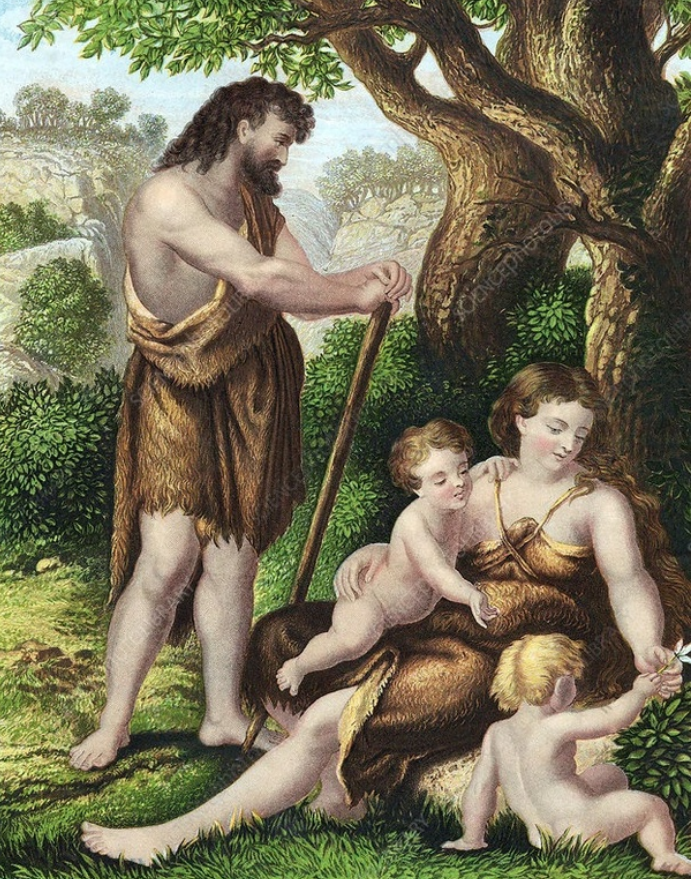The story of Adam and Eve, the first humans according to biblical tradition, is a foundational narrative in many cultures. While their creation and subsequent expulsion from Eden are well-known, the legacy they left behind through their descendants often remains unexplored. This article delves into the fascinating lineage of Adam and Eve’s grandkids, exploring the stories and genealogies surrounding them in biblical accounts and historical interpretations. We will unravel the complex family tree and examine the impact these early generations had on shaping human history.
This exploration will begin with Adam and Eve’s immediate children, then move through the intricate web of biblical genealogies that trace their descendants. We’ll analyze various methods used to trace this lineage and consider the historical interpretations surrounding these early generations. Ultimately, we aim to shed light on the profound influence Adam and Eve’s grandkids had on the course of human civilization.
Adam and Eve’s Children
According to the Book of Genesis, Adam and Eve had three sons: Cain, Abel, and Seth. Cain, known for his jealousy and anger, murdered his brother Abel in a tragic act that marked a turning point in human history. This event introduced sin and violence into the world, setting the stage for future conflicts and struggles.
Seth, born after Abel’s death, is often portrayed as a righteous figure who carried on Adam and Eve’s legacy of faith. He became the progenitor of a new line of descendants, considered more virtuous than Cain’s lineage. The Bible emphasizes Seth’s role in establishing a lineage that would ultimately lead to the birth of Noah, a pivotal figure in the story of human redemption.
Biblical Genealogies

The Bible provides detailed genealogies tracing the lineage of Adam and Eve’s descendants through various generations. These genealogical records are found throughout the Old Testament, particularly in the books of Genesis, Exodus, Numbers, and Chronicles. They serve as historical documents that attempt to establish a clear line of descent from the first humans to important figures like Abraham, Moses, and David.
These genealogies often list names and dates, highlighting key individuals and events along the way. While they offer valuable insights into the structure of ancient Israelite society and their understanding of history, it’s important to note that biblical genealogies may not always adhere to strict chronological accuracy or reflect modern historical methods.
The Importance of Genealogies
Biblical genealogies hold significant religious and cultural importance for many communities. They reinforce the concept of a divinely ordained lineage, connecting individuals to their ancestors and ultimately to God himself. These records serve as a reminder of God’s covenant with his chosen people and highlight the continuity of faith across generations.
Furthermore, genealogies often emphasize specific virtues or lineages associated with righteousness and faithfulness. By tracing the lineage back to Adam and Eve, these records aim to establish a connection between individuals and the original creation narrative, reinforcing their place within the grand scheme of God’s plan.
Tracing the Lineage
Tracing the lineage of Adam and Eve’s grandkids presents both challenges and opportunities for historical research. While biblical genealogies provide a starting point, they often contain gaps, inconsistencies, and potential errors.
Scholars utilize various methods to reconstruct these lineages, including comparing different genealogical accounts, analyzing archaeological evidence, and exploring linguistic connections between ancient cultures. However, due to the limitations of available sources, tracing the lineage with absolute certainty remains a complex endeavor.
Impact on Human History

The descendants of Adam and Eve’s grandkids played a pivotal role in shaping human history. Their actions, beliefs, and innovations influenced the development of civilizations, religions, and cultural practices across the globe.
From the establishment of early agricultural societies to the emergence of major world religions, the impact of these early generations is undeniable. Their stories serve as reminders of the interconnectedness of humanity and the enduring legacy of our ancestors.
Historical Interpretations
Throughout history, different cultures and scholars have interpreted the story of Adam and Eve’s grandkids in diverse ways. Some view them as literal historical figures, while others interpret their narratives as symbolic representations of human nature and societal development.
Religious traditions often emphasize the spiritual significance of these lineages, highlighting their connection to divine revelation and the covenant between God and humanity. Secular interpretations tend to focus on the social, cultural, and technological advancements attributed to these early generations.
Conclusion
The story of Adam and Eve’s grandkids offers a fascinating glimpse into the origins of human civilization. While tracing their lineage with absolute certainty remains challenging, exploring biblical genealogies, historical interpretations, and archaeological evidence allows us to piece together a more complete understanding of their impact on human history. Their descendants shaped the world we live in today, leaving behind a legacy that continues to influence our beliefs, values, and cultural practices.



